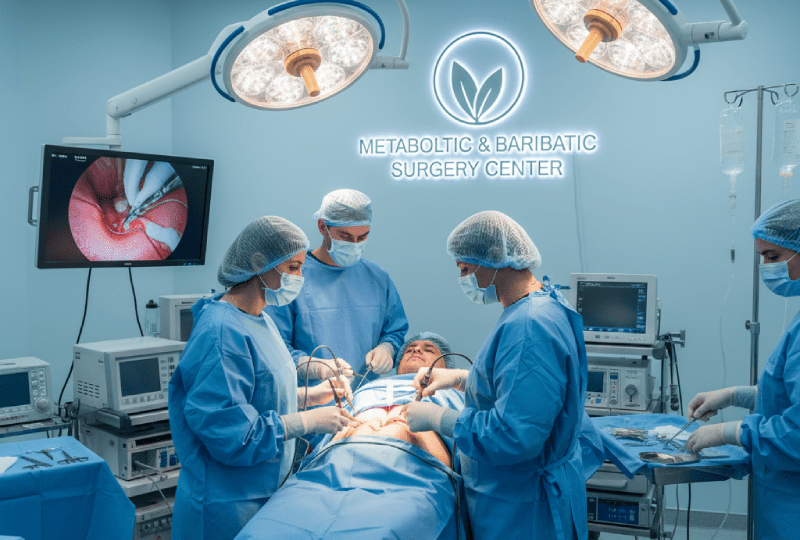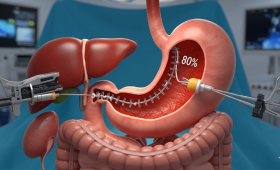Introduction: An Overview of Bariatric Surgery
Obesity is a chronic disease that is on the rise globally and leads to serious health problems. For individuals who cannot lose weight through traditional methods like diet and exercise, bariatric surgery offers an effective and permanent solution. These surgical methods are designed to accelerate weight loss and improve obesity-related health issues such as type 2 diabetes, high blood pressure, and sleep apnea. The two most common bariatric surgery methods are gastric sleeve and gastric bypass. In this guide, you will find details on both surgeries, their differences, and how to determine the best option for you.
What is Gastric Sleeve Surgery?
Gastric sleeve surgery is a procedure in which approximately 80% of the stomach is surgically removed. The remaining part of the stomach is shaped like a small tube, hence the name. This surgery not only reduces the volume of the stomach, helping the patient feel full with less food, but also helps to reduce appetite by removing the part of the stomach that produces the hunger hormone, ghrelin. In recent years, gastric sleeve has become the most popular bariatric surgery method due to its relative simplicity and good results.
How is Gastric Sleeve Surgery Performed?
Gastric sleeve surgery is usually performed using a laparoscopic method (keyhole surgery). Using special instruments and a camera inserted through several small incisions in the abdomen, a large part of the stomach is removed, and the stomach is stapled to form a tube shape. The surgery typically lasts between 1 and 2 hours. Thanks to the keyhole technique, patients experience less pain, the recovery process is faster, and the hospital stay is shorter.
Advantages of Gastric Sleeve Surgery
Gastric sleeve surgery has some significant advantages over gastric bypass. The procedure does not alter the flow of the digestive system in the stomach or intestines, which reduces the risk of vitamin and mineral malabsorption. The post-operative diet is easier to adapt to. Furthermore, it is a shorter and technically simpler surgery than gastric bypass. It is also very effective in treating obesity-related diseases like diabetes and hypertension.
Disadvantages and Risks of Gastric Sleeve Surgery
As with any surgical procedure, gastric sleeve surgery has potential risks and disadvantages. The permanent reduction of stomach volume is an irreversible procedure. There are surgical risks such as stomach leakage, bleeding, and infection. Post-operative reflux (heartburn) complaints may increase. For a successful outcome, the patient must strictly adhere to post-operative dietary and lifestyle changes; otherwise, there is a risk of weight regain.
What is Gastric Bypass Surgery?
Gastric bypass surgery is considered the gold standard of bariatric surgery. In this procedure, a small stomach pouch (approximately 20-30 ml) is created from the upper part of the stomach, and a section of the small intestine is connected to this pouch. This allows food to bypass a large part of the stomach and the first part of the small intestine, reaching the middle section of the intestine directly. It promotes weight loss through both a mechanism of volume restriction (eating less) and malabsorption (reduced calorie absorption).
How is Gastric Bypass Surgery Performed?
Gastric bypass surgery is also typically performed laparoscopically. The surgeon first divides the stomach to create a small upper pouch. The small intestine is then cut, and one end is connected to this new pouch, while the other end is connected to a lower part of the intestine. This complex procedure permanently alters the anatomy of the digestive system. The surgery time is longer than for gastric sleeve, usually lasting 2 to 3 hours.
Advantages of Gastric Bypass Surgery
The biggest advantage of gastric bypass is that it leads to greater and faster weight loss. It is also more effective than gastric sleeve in treating obesity-related type 2 diabetes. For many patients, diabetes can go into remission shortly after the surgery. The uncomfortable symptoms known as dumping syndrome, which occur after consuming sugary or fatty foods, encourage patients to avoid such foods.
Disadvantages and Risks of Gastric Bypass Surgery
Gastric bypass is a more complex procedure than gastric sleeve and has more potential risks. Post-operative vitamin and mineral deficiencies (especially B12, iron, calcium, and vitamin D) are more common and require lifelong supplementation. There is a risk of bowel obstruction, ulcers, and internal hernias. Although the surgery is reversible, doing so is technically very difficult and rarely performed.
Gastric Sleeve vs. Gastric Bypass: Weight Loss Differences
Both surgeries result in significant weight loss, but their mechanisms of action are different. Gastric bypass generally helps patients lose more weight, and this weight loss can occur more rapidly. Within the first year, a patient can lose 60% to 80% of their excess weight. In gastric sleeve surgery, this rate is usually between 50% and 70%. However, it should be remembered that long-term success depends more on the patient’s lifestyle changes than on the surgical technique.
Gastric Sleeve vs. Gastric Bypass: Effects on Diabetes
Gastric bypass is generally more effective than gastric sleeve in improving type 2 diabetes. This is related not only to weight loss but also to changes in intestinal hormones and insulin sensitivity. Because food reaches the lower parts of the intestines faster, hormones that regulate insulin production are secreted more effectively. This allows many patients to stop or reduce their diabetes medication shortly after surgery.
Gastric Sleeve vs. Gastric Bypass: Diet and Vitamin Supplementation
Patients who undergo gastric sleeve surgery must follow a liquid and purée diet in the initial post-operative period. In the long term, portion sizes are reduced, and healthy eating habits are adopted. Vitamin supplementation is usually necessary but is less intensive than for gastric bypass patients. Gastric bypass patients, however, must take vitamin and mineral supplements for life, as the changes in the digestive system permanently reduce absorption.
Which Surgery to Choose? The Decision-Making Process
Deciding which surgery is best for you depends on a number of factors. Your body mass index (BMI), existing obesity-related health problems (especially type 2 diabetes), eating habits, and personal goals all influence this decision. Your surgeon will evaluate these factors and recommend the most suitable option for you. If diabetes control is your priority, gastric bypass may be more appropriate. If you want a less complex procedure, gastric sleeve may be a better option.
Pre-Operative Preparation Process: A Multi-Dimensional Approach
Bariatric surgery is not just a single operation; it is a comprehensive process that will change your life. Pre-operative preparation is conducted by a team consisting of a surgeon, dietitian, psychologist, and other specialists. During this process, your eating habits are evaluated, your psychological readiness for surgery is determined, and necessary medical tests are performed. A pre-operative weight loss program may also be part of this preparation.
Post-Operative Recovery and Hospital Stay
When gastric sleeve and gastric bypass surgeries are performed laparoscopically, the hospital stay is generally 2 to 4 days. In the first few days after surgery, pain management is provided, and patients begin to consume liquid foods. The return to normal daily activities usually takes 2-3 weeks. Full recovery and adaptation to the new diet can take several months.

Potential Complications and Management
Both surgeries have potential complications. These include wound infection, blood clots, leakage, and anesthesia-related risks. These risks decrease in direct proportion to the experience of the clinic and the surgeon performing the surgery. Regular follow-up and strict adherence to the doctor’s instructions after surgery ensure that potential complications are detected and managed early.
The Rise of Turkey in Bariatric Surgery
In recent years, Turkey has become a global leader in the field of bariatric surgery. While offering much more affordable costs compared to Western countries, it does not compromise on service quality and medical standards. Many Turkish surgeons are internationally recognized experts with extensive experience in this field. Turkey offers the dual advantage of being both a safe medical destination for patients and a tourism hub with rich historical and cultural attractions.
Meet Cure Holiday: Comprehensive Health Tourism Services
Cure Holiday is a health tourism agency established to support you at every stage of your bariatric surgery journey. It offers all-inclusive packages specially designed for its clients, making the entire treatment process smooth and comfortable from start to finish. Cure Holiday is not just an intermediary; it is a reliable partner that ensures you and your health are in the best hands.
What is Included in Cure Holiday Packages?
The packages offered by Cure Holiday typically include the following services:
- Surgery at international standards: Surgery performed by expert and experienced surgeons in hospitals with the latest technology.
- Airport transfer: Round-trip transfers from the airport to your hotel and the hospital.
- Accommodation: Stay in luxury and comfortable hotels.
- Pre- and post-operative tests: All necessary medical tests and check-ups for the surgery.
- Medication and vitamins: Medications and vitamin supplements you need to use after the surgery.
- 24/7 support: A personal consultant and interpreter to accompany you throughout the treatment process.
Why is Bariatric Surgery More Affordable with Cure Holiday?
The main reasons for the lower cost of bariatric surgery in Turkey are that operating expenses and labor costs are more reasonable than in Western countries. Additionally, health tourism agencies like Cure Holiday make bulk agreements with hospitals to offer special prices and comprehensive packages for patients. This allows patients to save significantly on both treatment costs and travel and accommodation expenses.
The Treatment Process and Planning with Cure Holiday
The bariatric surgery process with Cure Holiday begins while the patient is still in their home country. First, the patient receives an online consultation, and their medical history is evaluated. After suitability is confirmed, Cure Holiday organizes the patient’s travel and accommodation plans. When the patient arrives in Turkey, they are transferred, pre-operative tests are performed, and the surgery is carried out. The patient is also supported during the post-operative recovery period and ensured a safe return to their country.
Experienced Surgeons and High Medical Standards
The surgeons and hospitals with whom Cure Holiday collaborates are specialized and internationally accredited institutions. This guarantees that patients will receive the highest quality medical service. The surgeons have extensive experience in both gastric sleeve and gastric bypass surgeries and use the latest surgical techniques. This experience increases the success rate of the surgery and minimizes the risk of complications.
The Psychological and Social Benefits of Having Surgery in Turkey
Having bariatric surgery in Turkey is not just a physical transformation. Combining the treatment process with a holiday experience increases patients’ motivation and makes them feel psychologically better. Exploring the historical and cultural richness of Istanbul, the magnificent nature of Antalya, or the unique landscape of Cappadocia during the pre- and post-operative period makes the recovery process enjoyable.
Lifestyle Changes for Long-Term Success of Bariatric Surgery
Surgery is just the beginning of the weight loss journey. For long-term success, the patient must permanently change their eating habits, exercise routine, and lifestyle. A team of surgeons and dietitians guides the patient during the post-operative period and facilitates the transition to a healthy lifestyle. Cure Holiday continues to support its patients in this follow-up process as well.

Long-Term Vitamin and Mineral Supplements
Especially after gastric bypass surgery, it is mandatory to take vitamin and mineral supplements for life, as the body absorbs fewer nutrients. These supplements include essential nutrients like B12, iron, calcium, and vitamin D. These supplements are also generally recommended for patients who undergo gastric sleeve surgery. Cure Holiday also provides comprehensive consultation to patients on post-operative nutrition and supplementation plans.
Post-Operative Social Support Groups
Adapting to a new life after bariatric surgery can sometimes be challenging. Social support groups are of great importance to avoid feeling alone during this process. Cure Holiday brings together patients who have undergone surgery to share their experiences and support each other. These groups play a critical role in overcoming potential difficulties and maintaining motivation after surgery.
The Public Perception of Bariatric Surgery
Bariatric surgery is still a misunderstood topic in society. Many people may think that this surgery is a “lazy solution.” However, this surgery is a medically proven treatment method for individuals struggling with obesity and whose health is at serious risk. Surgery is just a tool; the real success comes from the patient’s determination and commitment to lifestyle changes.
Cure Holiday Guarantee: Travel Insurance and Protection
Cure Holiday offers special travel insurance options to secure its patients’ travel and treatment processes. This insurance protects patients in case of unexpected situations, travel cancellations, or additional medical expenses. This way, patients can focus on their treatment and enjoy their journey without any worries.
A Life-Changing Decision: Take the First Step
Bariatric surgery is not just about losing weight; it’s about stepping into a healthier, more energetic, and more confident life. Whether it’s gastric sleeve or gastric bypass surgery, it is important to consult a specialist and evaluate all options to make the right decision. Working with a reliable partner like Cure Holiday when making this big decision will make your journey much easier and more successful.
Conclusion: Your New Life Begins with Cure Holiday
Bariatric surgery is an investment that will change your life from start to finish. If the high costs in France concern you, the high-quality and affordable solutions offered by Turkey might be ideal for you. Cure Holiday simplifies this process for you with expert surgeons, modern hospitals, and all-inclusive packages. Take action now to step into a healthy future and contact Cure Holiday to take that first life-changing step. Remember, a new beginning awaits you!



